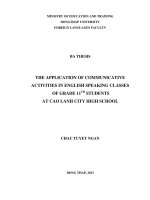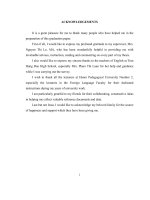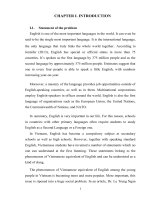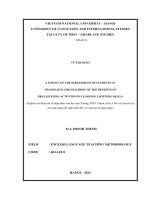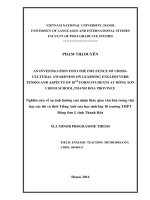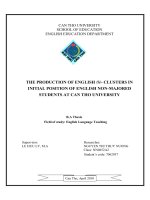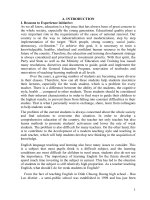the current situation towards the phenomenon of Vietnamese equivalent of English among the students at Cao Ba Quat high school
Bạn đang xem bản rút gọn của tài liệu. Xem và tải ngay bản đầy đủ của tài liệu tại đây (210.91 KB, 23 trang )
CHAPTER I. INTRODUCTION
I.1. Statement of the problem
English is one of the most important languages in the world. It can even be
said to be the single most important language. It is the international language,
the only language that truly links the whole world together. According to
Jennifer (2013), English has special or official status in more than 75
countries. It’s spoken as the first language by 375 million people and as the
second language by approximately 375 million people. Estimates suggest that
one in every four people is able to speak a little English, with numbers
increasing year-on-year.
Moreover, a mastery of the language provides job opportunities outside of
English-speaking countries, as well as in them. Multinational corporations
employ English-speakers in offices around the world. English is also the first
language of organisations such as the European Union, the United Nations,
the Commonwealth of Nations, and NATO.
In summary, English is very important in our life. For this reason, schools
in countries with other primary languages often require students to study
English as a Second Language or a Foreign one.
In Vietnam, English has become a compulsory subject at secondary
schools as well as high schools. However, together with speaking standard
English, Vietnamese students have invented a number of statements which no
one can understand at the first listening. These statements belong to the
phenomenon of Vietnamese equivalent of English and can be understood as a
kind of slang.
The phenomenon of Vietnamese equivalent of English among the young
people in Vietnam is becoming more and more popular. More important, this
issue is ripened into a huge social problem. In an article, Dr. Le Trung Ngan
1
has said “This phenomenon firstly seemed to be harmless but it has gradually
left unforeseen consequences”.
Because of the current state of using the so-called slang among the
Vietnamese youths and the serious consequences left, this study is carried out
with the purpose of explorring the current situation towards the phenomenon
of Vietnamese equivalent of English among the students at Cao Ba Quat High
School – whether they are interested in using slang or not, and their opinions
about this phenomenon.
I.2. Objectives
The objective of this study is to explore the current practice of using slang,
specially, the words and phrases towards the phenomenon of Vietnamese
equivalent of English in such 7 aspects as the extent of the knowledge of
slang, the frequency of using slang, the reasons for not using slang, when to
use slang, the reasons for using slang, the feelings about slang and the
opinions towards the impacts of using slang.
2
CHAPTER II. LITERATURE REVIEW
2.1. Slang
Slang is a compound word formed by the combination of ‘s’ in ‘street’ and
‘lang’ in ‘language’. Therefore, slang is used to referred to Street language, an
informal form of a language, used in daily communication by a certain group
of people.
According to the encyclopedia, slang consists of a lexicon of non-standard
words and phrases in a given language. Use of these words and phrases is
typically associated with the subversion of a standard variety (such as
Standard English) and is likely to be interpreted by listeners as implying
particular attitudes on the part of the speaker. In some contexts, a speaker's
selection of slang words or phrases may convey prestige, indicating group
membership or distinguishing group members from those who are not a part
of the group.
For example:
Cockney rhyming slang is the language used in London by Cockney – the
people who were born within the sound of Bow Bells; therefore, the people
from other places cannot understand at the first listening.
The Vietnamese students also have their own slang.
No table! (slang): no comment!
No star where (slang): no problem/ not at all
Ugly tiger (slang): shy
Black chicken (slang): okey
3
In short, slang is an informal kind of language that is not considered part
of the standard vocabulary of a language and that is used very informally in
speech, especially by a particular group of people.
2.2. Vietnamese equivalent of English
The phrase Vietnamese equivalent of English refers to the way of using
Vietnamese equivalent of one English word instead of it when
communicating, the English words are combined together to make up a
sentence with Vietnamese grammar according to homophonic principle.
These sentences do not agree to both English and Vietnamese; in this case,
the Vietnamese equivalent is called Slang. ( />su/mot-dung-tieng-anh-theo-nghia-viet-cua-teen-2142857.html)
The principle of forming the so-called slang is mainly based on the
homophonic phenomenon in Vietnamese language. The English words are
translated into Vietnamese and combined together to make up a phrase that
has a Vietnamese tame meaning.
These examples will make it easier to understand the Vietnamese
equivalent of English.
No table!(slang): No comment!
Umbrella tomorrow (slang): sugared dry apricot
In the first example, no table is used instead of no comment that has the
Vietnamese equivalent of miễn bàn.
In Vietnamese, table and comment have the same pronunciation bàn;
however, in English, table refers to an article of furniture consisting of a flat,
slab top supported on one or more legs or other supports, while comment has
the meaning of a remark, observation or criticism. As a result of this
homophonic phenomenon, the Vietnamese youths use no table in stead of no
comment.
4
Let’s take a look on the second example, Sugared dry apricot is a kind of
food and its Vietnamese equivalent is ô mai.
In Vietnamese, umbrella is pronounced ô – a portable device used for
protection against rain, snow, etc, and consisting of a light canopy supported
on a collapsible metal frame mounted on a central rod; tomorrow is
pronounced mai – the day following today, this is why umbrella tomorrow is
used instead of sugared dry apricot.
The other statements belonging to this phenomenon will be mentioned in
part 2.3 below.
2.3. List of statements involved in this phenomenon.
Below is the list of popular statements involved in this phenomenon
which are collected from a private blog blog.zing.vn and from the website
www.vietbao.vn.
Black chicken (Okey)
Clothes donkey (đồ con lừa)
Dog die (chó chết)
Down birth have fun (Giáng sinh vui vẻ)
Dream what (Tưởng gì)
Eat picture (ăn ảnh)
Go die go (đi chết đi)
Go dust (đi bụi)
Home face road, dad do big (nhà mặt phố, bố làm to)
Hover go for water it pure (lượn đi cho nước nó trong)
I wanna toilet kiss you (anh muốn cầu hôn em)
5
I love toilet you sit down (tôi yêu cầu bạn ngồi xuống)
I no want salad again! (tôi không muốn cãi nhau với anh nữa)
Know die now (Biết chết liền)
Lemon question (chảnh)
Like is afternoon (Thích thì chiều)
No dare where (không dám đâu)
No family live (vô gia cư)
No I love me (không ai yêu tôi)
No four go (Vô tư đi)
No star where (không sao đâu)
Pickhand dot com (bó tay.com)
Seven love (Thất tình)
Sky down no enemy (thiên hạ vô địch)
Son with no girl (con với chả cái)
Star I miss mono? (vì sao tôi cô đơn?)
Stop we share hand (thôi mình chia tay)
Story minor (Chuyện vặt)
Sugar I I go, sugar you you go (đường tôi tôi đi, đường anh anh đi)
Sugar sugar a hero man (Đường đường một đấng anh hùng)
Ugly tiger (xấu hổ)
Umbrella star go again (dù sao đi nữa)
6
Uncle like (Chú thích)
Understand die now (hiểu chết liền)
You think you delicious? (mày nghĩ mày ngon à?)
2.4. The current state of the phenomenon amongst the young people
in Vietnam in recent years.
Prof. Dr. Nguyen Van Khang, the former deputy director of the linguistic
institute, believes that slang is a kind of language belonging to certain social
groups. When there are different groups in a society, there are different kinds
of language that go with these groups.
In the past, it is said that slang was unpleasant, for it was undesirable
gangs’ language. For this reason, it can be acceptable in informal
communication but not appropriate in formal one.
However, Slang, for the time being, is used by most of social groups
such as students, pupils, office staffs, journalists. etc. The young people in
Vietnam nowadays like using slang and consider it a fashionable, particular
and typical feature of their group. They use slang anywhere – at school, at
home, at the office; with anyone - friends, teachers, parents, even relatives.
They update the latest slang from the internet and compare with friends. The
young even set up private pages to discuss about slang and introduce them to
others.
According to vnexpress.net – a Vietnamese electronic newspaper, in
many forums, the youths often use this kind of language and even create a
slang dictionary. This phenomenon is inclined to develop and become more
and more popular over time and space, it spreads from the South to the North,
from urban areas to rural ones, from the past to the present.
7
The young introduce slang to friends in a web page
There are four primary fators that make the youths interested in the
phenomenon of Vietnamese equivalent of English.
According to Eric Partridge (1934), Today and Yesterday, the young use
slang to communicate with others just for the fun of the thing. They want to
add the waggishness to their conversation.
The second reason is that slang is used as a means by which the insiders
make other people unable to identify something.
Another reason is that the young use this kind of language by habbit.
Quynh Nhu – an overseas student said that “Many people use slang by habbit
and I sometimes inadvertently use them when talking to my parents”.
( />teen-2142857.html).
One more reason, according to Mrs. Nguyen Thi Ngoc Thanh – a teacher
of English at Tran Hung Dao Special High School, is that the young use slang
because they do not have a thorough grasp of vocabulary and grammar;
thereby, they use slang instead of standard English.
8
In fact, using slang leads to serious consequences.
First, using slang in communication makes the interlocutors difficult to
comprehend and is even open to misunderstanding.
Second, using slang in a long period of time without controlling has
made up a habit of using them unconsciously. Most of the youths now
certainly face many difficulties in constructing a sentence in grammar as well
as in using words in contexts.
Last but not least, a large number of the young people in Vietnam have a
tendency to use this kind of language casually and widely which damages and
crooks the Vietnamese language’s pureness.
9
CHAPTER III. CONTENTS AND METHODOLOGY
3.1. Subjects
The subjects of this study are fifty four students, who are at
intermediate level in English proficiency.
3.2. Contents
This study aims to find out the current situation towards the
phenomenon of the Vietnamese equivalent of English among the students
at Cao Ba Quat high school in terms of the extent of knowledge of slang,
the frequency of using slang, the reasons for not using slang, when to use
slang, the feelings of the students about slang and the opinions towards
the impacts of using slang.
3.3. Methodology
The instrument to collect the data used in this study is questionnaire
survey.
The researcher chose this method because it has some advantages.
First, the responses are gathered in a standardised way, so questionnaires
are quite objective. Second, it is relatively quick to collect the information
using a questionnaire. Finally, potential information can be collected from
a large portion of a group by using questionnaire.
In this study, the questionnaire was designed in the form of a test so
that it is easy for the students to answer the questions and it helps the
researcher collect the data quickly. The questionnaire was given to 54
students at Cao Ba Quat High School in class time. The students were
explained how to answer each question. In 15 minutes, the students
completed and returned it directly to the researcher.
10
After collecting the students’ answers, the researcher carried out a
data analysis and created a summary table.
CHAPTER IV. FINDINGS AND DISCUSSIONS
11
This chapter presents and discusses the research findings from the
survey questionnaire of this study.
The results are divided into 7 sections. The first section presents and
discusses the knowledge of slang of the students at Cao Ba Quat High
School; the second section is about the frequency of using slang; the third
one is about the reasons for not using slang; the fourth is about the reasons
for using slang; the next is about the feelings and the last one is about the
opinions of the students about the impacts of using slang.
4.1. Extent of knowledge of slang
Chart 4.1. Students’ knowledge of slang
Chart 4.1 above illustrates the extent of knowledge of slang. It shows
that the majority of the respondents (n = 35, 65%) know 6 to 15 statements
in the total of 37 statements of slang. The minority of the students (n = 1,
2%) knows about 26 to 37 statements. 26% (n = 14) out of the total know
from 16 to 25 statements.
The figures in this section indicates that the students at Cao Ba Quat
High School do not know many of the statements involved in the
phenomenon of Vietnamese equivalent of English.
4.2. Frequency of using slang
12
1 – 5 statements
6 – 15 statements
16 – 25 statements
26 – 37 statements
The chart below describes the frequency of using slang of the students
at Cao Ba Quat High School.
Chart 4.2. The frequency of using slang
The chart shows that the majority (n = 22, 41%) never use slang while
only 11% (n = 6) of the respondents chose level “always”. 26% (n = 14)
sometimes use slang and 22% (n = 12) rarely use slang.
The fact is that the number of students who do not and rarely use
slang is bigger than that of the students who use slang. Therefore, most of
the students at Cao Ba Quat High School do not often use slang when
communicating.
4.3. Reasons for not using slang
Chart 4.3. Reasons for not using slang
According to chart 4.3, over half of the students who have never used slang
(n = 12, 54%) state that they do not use slang because slang is rubbishy while
13
always
sometimes
rarely
never
You do not know the slang
Slang is rubbishy
Slang is difficult to
understand
few (n = 4, 18%) do not use slang because they don’t know slang. The rest (n =
8, 28%) believe slang is difficult to understand, so they do not use them when
communicating.
Clearly, the reason for not using slang mainly lies in the nonsense of them.
4.4. Reasons for using slang
The chart below describes the distribution of respondents regarding
the reasons for using slang.
Chart 4.4. Reasons for using slang
From the chart above, it is clear that 47% (n = 15) of the respondents
use slang just for fun while no one (0%) uses slang because it is their
group’s code. A few students (n = 9, 28%) use slang by habit and 25% (n
= 8) use slang because of the lack of vocabulary and grammar.
Obviously, nearly a half of the students uses slang for the reason of
the fun.
4.5. When to use slang
14
Lack of vocabulary and
grammar
Just for fun
Group’s code
By habit
Chart 4.5. When to use slang
As can be seen in the chart, a large number of students (n = 30, 93%)
reported that they had used slang when communicating with their friends.
Only 7% (n = 2) reported they had communicated with both friends and
parents and relatives by slang.
It can be said that most of the students use slang to communicate with
friends only.
4.6. Feelings
In this section, data concerning the feelings of the students about
slang is provided.
Chart 4.6. Students’ feelings about slang
As shown in chart 4.6, the majority (n = 23, 43%) agree that the
statements involved in the phenomenon of Vietnamese equivalent of
15
Communicating with friends
Communicating with parents and
relatives
Both
Other
Rubbishy
Interesting
No opinion
English are rubbishy while 33% (n = 18) of the respondents agree that
these statements are interesting. Among 54 students, 24% (n = 13)
consider these statements are neither rubbishy nor interesting.
Therefore, the number of students who consider slang rubbishy is
bigger than that of the students who think that slang is interesting.
4.7. Opinions towards the impacts of using slang
This section presents the opinions towards the impacts of using slang
of the students at Cao Ba Quat High School.
Chart 4.7. Students’ opinions about the impacts
of using slang
Chart 4.7 above illustrates that the majority of the respondents (n =
22, 41%) believe that slang is harmful. The percentage of the students who
agree that slang is both harmful and helpful is 22% (n = 12) while that of
the students who support the helpfulness of slang is 19% (n = 11). The
percentage of the students who had no opinion is 18% (n = 9).
It can be said that the number of students who believe that slang is
harmful is twice as many as the number of students who support the
harmfulness of slang.
CHAPTER V. CONCLUSION AND RECOMMENDATION
16
harmful
helpful
both
no opinion
This chapter presents the result of the study about the current practice
of the students at Cao Ba Quat High School towards the phenomenon of
Vietnamese equivalent of English and as the same time suggests some
recommendation for reducing as well as preventing the development of
using slang among them on the ground of the reasons of using slang from
the study.
5.1. Conclusion
From the figures showed in the charts in Chapter IV, it’s clearly to
see that although the phenomenon of Vietnamese equivalent of English is
becoming more and more popular among the Vietnamese youths, it does
not seem to be true to the current practice of the students at Cao Ba Quat
High School.
The Vietnamese youths are very interested in using slang, they update
slang every day and introduce them to their friends to broad the knowledge
of slang. As a result, they know hundreds of slang. However, the students
at Cao Ba Quat High School do not know many of them, most of the
students know just from 6 to 15 statements of slang.
In terms of the frequency of using slang, astonishingly, most of the
students at Cao Ba Quat High School do not often use slang when
communicating and even 41% never use slang.
In terms of the reasons why the students use and do not use slang, the
researcher explored that most of them do not use slang because they find
slang rubbishy and many of the them use slang just for fun.
In the aspect of when to use slang, while the Vietnamese youths use
slang to communicate with friends, teachers, even parents and relatives,
most of the students at Cao Ba Quat High School just use slang to
communicate with their friends.
17
It is surprisingly from the study that a lot of students at Cao Ba Quat
High School consider slang as rubbishy rather than interesting while most
of the young consider slang interesting and fashionable.
The last aspect in this reseach is about the opinions towards the
impacts of using slang. Through the figures in the study, it is clear that
most of the students at Cao Ba Quat High School are aware of the ill effect
of using slang, only a few of them, only 19% support the helpfulness of
using slang.
5.2. Recommendation
The phenomenon of Vietnamese equivalent of English was apparently
serious at firs but it is not as serious as being thought after a study is
conducted on the students at Cao Ba Quat High School.
However, prevention is better than cure. Based on the findings of the
study, the researcher would like to state some suggestions to reduce as
well as prevent the development of using slang among the students at Cao
Ba Quat High School.
According to the study, a few students use slang by habbit; therefore,
the teachers should correct the students’ habbit as soon as catching them
using slang when communicating. There are also a small number of
students (25%) using slang because of the lack of vocabulary and grammar
(Chart 4.4), why don’t the teachers pay more attention to helping the
students improve their English proficiency.
Besides, the students themselves should understand the serious
consequences left by using slang, then try to give up the habbit of using
slang as soon as possible.
REFERENCES
18
1. “English language”,
/>2. Eric Partridge (1934). Today and Yesterday.
3. Fahad Razzaque. “Importance of English language”,
4. “Giai ma ngon ngu 9x”, diendan.hocmai.vn
5. GS.TS Nguyễn Văn Khang. “Lạm dụng tiếng lóng trong giới trẻ - Thực
trạng đáng báo động”, hanoimoi.com.vn
6. “Hay cho tiếng Anh ghép”,
7. “Mốt dùng tiếng Anh theo nghĩa Việt của teen”, vnexpress.net
8. “Nói tiếng Anh biến hóa như teen Việt”, kenh14.vn
9. “Pleisure Pains In Collage Life” (2010),
10. “Slang”, />11. “Vat va voi ngon ngu teen”, />va-voi-ngon-ngu-teen/55300971/412/
APPENDIX
19
Questionaire
1. How many phrases and sentences do you know?
Black chicken (Okey)
Clothes donkey (đồ con lừa)
Dog die (chó chết)
Down birth have fun (Giáng sinh vui vẻ)
Dream what (Tưởng gì)
Eat picture (ăn ảnh)
Go die go (đi chết đi)
Go dust (đi bụi)
Home face road, dad do big (nhà mặt phố, bố làm to)
Hover go for water it pure (lượn đi cho nước nó trong)
I wanna toilet kiss you (anh muốn cầu hôn em)
I love toilet you sit down (tôi yêu cầu bạn ngồi xuống)
I no want salad again! (tôi không muốn cãi nhau với anh nữa)
Know die now (Biết chết liền)
Lemon question (chảnh)
Like is afternoon (Thích thì chiều)
No dare where (không dám đâu)
No family live (vô gia cư)
No I love me (không ai yêu tôi)
No four go (Vô tư đi)
20
No star where (không sao đâu)
Pickhand dot com (bó tay.com)
Seven love (Thất tình)
Sky down no enemy (thiên hạ vô địch)
Son with no girl (con với chả cái)
Star I miss mono? (vì sao tôi cô đơn?)
Stop we share hand (thôi mình chia tay)
Story minor (Chuyện vặt)
Sugar I I go, sugar you you go (đường tôi tôi đi, đường anh anh đi)
Sugar sugar a hero man (Đường đường một đấng anh hùng)
Ugly tiger (xấu hổ)
Umbrella star go again (dù sao đi nữa)
Uncle like (Chú thích)
Understand die now (hiểu chết liền)
You think you delicious? (mày nghĩ mày ngon à?)
2. How often have you used these phrases and sentences when
communicating?
a. Always – skip q. 3
b. Sometimes – skip q. 3
c. Rarely – skip q. 3
21
d. Never – skip q. 4, q. 5 & q.6
3. Why don’t you use slang when communicating?
a. I don’t know them
b. They’re rubbishy
c. They’re difficult to understand
4. when do you use these statements?
a. Communicating with friends
b. Communicating with parents and relatives
c. Both a & b
d. Others
5. Why do you use them?
a. Just for fun
b. Group’s code
c. By habit
c. Lack of vocabulary and grammar
5. What do you think about this kind of language?
a. Rubbishy
b. Interesting
c. No opinion
6. What is your opinions about the impacts of using this kind of
language?
a. Harmful
b. Helpful
22
c. Both
d. No opinion
Thanks for your help!
23
